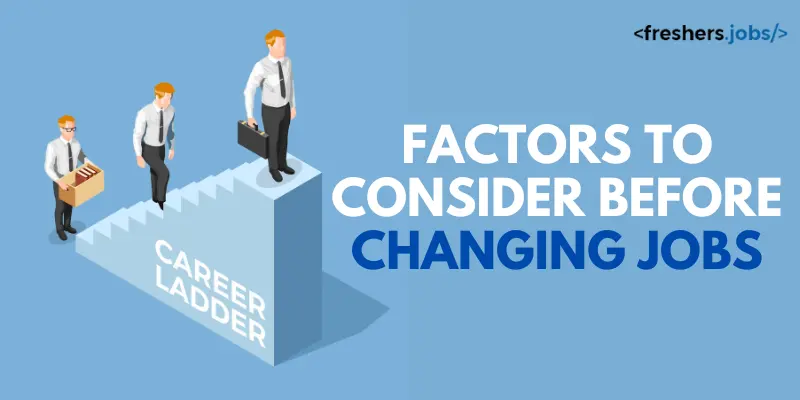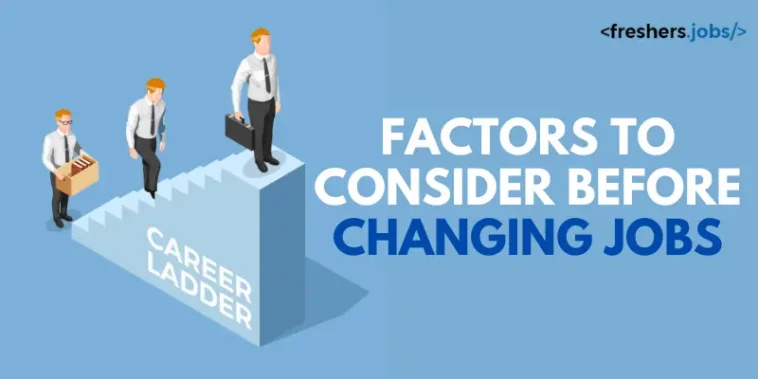Your job should give you the feeling that you’re on the right path. Changing careers could be advantageous for someone, regardless of how happy they are in their current position. You should wonder what to consider when changing jobs. If you are a fresher and thinking about shifting careers do check Free Alert Job. In this blog, you are here to see the Things to look for while changing jobs.

Indications that a new job search is necessary
You should be somewhat satisfied with your employment if you are not looking forward to going to work every day. Losing that emotion might indicate that something has to change.
Your personal life is being impacted by high levels of stress. Although difficulties at work can occasionally be frustrating, they should not affect your personal life.
Your comments and ideas are not valued. You want to feel appreciated for the best ideas and efforts you are putting into your work. You may need to make a change if you don’t always feel this way.
Your family and friends frequently advise you to look for a new job. Family members and friends probably know many things about you. Your loved ones will often get in touch with you when they sense something is not quite right. It could be a smart idea to get a new job if a number of individuals in your life are suggesting you.
Living expenses are becoming more difficult to maintain due to low salaries. The amount of money required to meet one’s fundamental necessities is known as the cost of living. You need to hunt for another job if your pay or earnings are insufficient to meet your living expenses.
You often imagine yourself in a different professional role. Imagining yourself in a different profession or vocation on a regular basis may indicate you are ready for a change.
Consider these eight factors before transferring jobs
Individual career aspirations
Your objectives at work are reflected in your personal professional goals, which could include your ideal daily schedule or your desired career path. Your work should be in line with your desires if you want it to support you in achieving your career goals. If staying in your current position will allow you to advance in your career, you might wish to do so.
Opportunities for professional growth at work
Organizations frequently provide meetings, training sessions, and courses to assist staff members in developing their technical and interpersonal skills. Typically, they also carry out evaluations and provide tailored comments to support that development.
Regular feedback and professional development show how much a company is willing to spend on and support its staff. Your professional potential may take longer to realize if you aren’t getting constructive criticism or beneficial training, and you may feel unsupported. This might take a while to recognize why you want to switch company.
Progress in the workplace
The ability of workers to advance from one job to another is referred to as progress in the workplace. Movements need to be vertical and offer additional advantages, such as a more senior position, a better income, better insurance or retirement benefits, or more schedule flexibility.
Your chances of moving forward on the corporate ladder are higher if your current employer offers numerous senior positions or leadership prospects. Working for a company with little chances for leadership or growth might not be the best choice for you if your current employment does not satisfy you.
Balance between work and life
The amount of time and energy a person devotes to their job and work-related activities in relation to the amount of time and energy they have available for their personal lives is known as work-life balance. For full-time jobs, 40 hours of work per week is usual.
A person has somewhat more than 120 hours per week for relaxation, recreation, and attending to personal duties if their commute takes less than an hour in total each workday. Your work-life balance may deteriorate if you are working long hours or if your commute takes a long time.
Offers for employment
The industry of professional recruiting is large. It’s possible that you’re getting calls about job offers in your industry. Getting recruitment offers may encourage you to resign from your position, particularly if the offer comes with a higher title or more money.
Multiple offers from recruiters probably indicate that you have the qualifications, abilities, or traits that employers are looking for. If your current job is fulfilling, you might want to think about asking someone there how to advance in rank or get paid more. For those looking for Fresher Jobs in Gurgaon, receiving multiple offers can also be a sign of your marketability and the demand for your skills.
Workplace conditions
Your workplace should ideally foster both professional and emotional development. Collaboration, cordial relationships, and good work performance can all be fostered in a healthy work environment. Workplace culture should be inclusive, encouraging, and focused on the team as a whole. Unsatisfactory work environments might make workers feel underappreciated or excluded.
Personnel turnover
The pace of departures from the organization is known as employee turnover. It is a loss of skill in the workplace and can be brought on by retirements, layoffs, resignations, or terminations. Although turnover rates differ by geography and industry, there are averages.
The United States Bureau of Labor and Statistics reports that 1.4% of workers face layoffs or terminations, and 2.2% of workers abandon their jobs each month. An unsteady work environment may be indicated by a higher-than-average turnover rate.
Satisfaction at work
A person’s whole happiness and satisfaction at work is reflected in their job satisfaction. Though there are some universal values, personal pleasure differs from individual to person. Extrinsic and intrinsic satisfaction are the two components of job satisfaction.
A person who finds fulfillment in the work they do is said to have intrinsic job satisfaction. Interpersonal connections, pay, and working circumstances all affect extrinsic job happiness. If any one or all of these are absent, adjustment is probably necessary.
How to determine if changing careers is a good idea
List your short- and long-term objectives
Your daily routine and targets or quotas are related to your short-term professional ambitions. You might want less stress or more time in your day, for instance. Your ideal career and lifestyle are reflected in your long-term professional ambitions. You might like to work as a corporate executive or a professor, for instance. Either your long-term or short-term ambitions should be supported by your current position.
Provide a concise summary of the measures you need to take to achieve your long-term goals so that your current employment and these can be compared. Next, make an attempt to come up with a rough schedule for how you plan to achieve your objectives.
Set your needs and desires first
Your personal ideal for work should be reflected in your professional needs and desires. Think about your income, perks, and professional aspirations. You should also assess the degree to which your work life contributes to your personal contentment and satisfaction.
Examine the work-life balance that your position provides and consider the implications for your relationships and overall health. Try to evaluate the significance of each of these elements for you individually. Your necessities are represented by the most essential objects, and your wants are represented by the other items.
You have the option to indicate whether your current position meets all of your necessities but not your wants. You might think about shifting jobs if your needs are not being addressed.
Make a decision and act
You should have a decent notion of whether you want to change employment after rationally going over your goals and objectives, reflecting on your feelings, and speaking with friends and family. If you make the decision to remain at your current job, then make the required efforts to try to achieve fulfillment and pleasure there.
This could entail accepting new duties, corresponding with the human resources division, or speaking with a supervisor. In the event that you make the decision when to change jobs, send out your resume and begin looking for anything better.
These things to consider when changing jobs require careful consideration of your career goals, opportunities for growth, work-life balance, and job satisfaction. Assess your current situation, set clear objectives, and prioritize your needs and desires. Whether you choose to stay or move on, take proactive steps to ensure your professional and personal fulfillment. Making informed decisions will help you find the right path for your career. For more informative blogs, do check Freshers Jobs.




